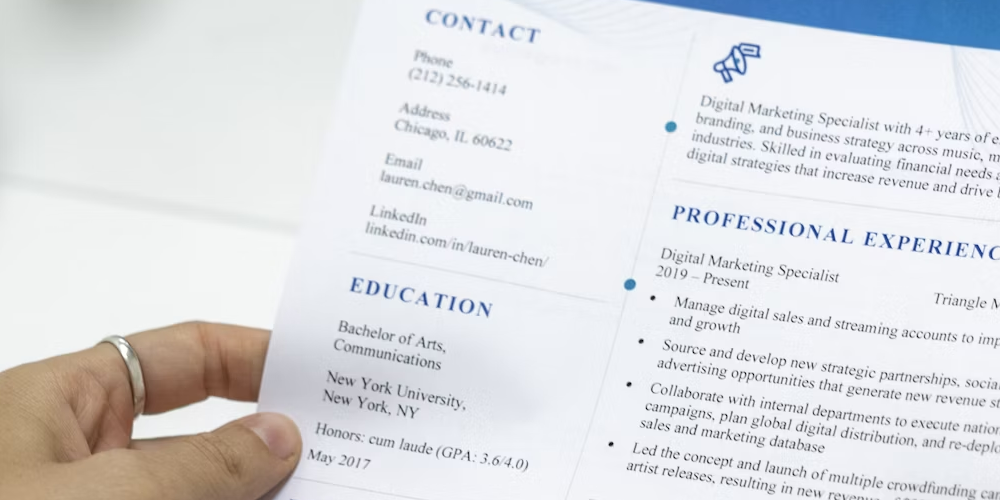
Losing a job can feel like a monumental setback in your career journey. The initial shock and disruption can shake your confidence and disrupt your sense of security. However, with the right mindset and strategy, bouncing back stronger than ever is not just possible, it’s highly probable. This challenging time can catalyse substantial personal and professional growth. By reevaluating your career goals, refining your skills, and expanding your network, you can turn a job loss into a springboard for your career resurgence. This article outlines practical steps to help you navigate this transition, empowering you to emerge more resilient and better positioned for new opportunities.
How to Manage Emotions After Job Loss
Analysing Reasons Behind Your Job Loss
CV Tips: How to Update and Customise for Job Search Success
Skill Enhancement Strategies for Job Seekers
Networking Techniques for Effective Job Hunting
Freelancing and Consulting: Alternative Career Paths Post Job Loss
Interview Preparation Guide for Bouncing Back After Job Loss
Staying Motivated During Your Job Search Journey
Exploring Career Change Opportunities After Job Loss
Using Recruitment Agencies to Accelerate Your Job Search
How to Manage Emotions After Job Loss

First things first: it’s entirely natural to feel upset, angry, or disillusioned after losing a job. These reactions are a normal part of coping with a significant life change. Allow yourself a moment to process these feelings fully. Acknowledging your emotions is a crucial step in your recovery process, as it helps prevent these feelings from becoming overwhelming or hindering your progress. It’s important to give yourself a brief period to grieve and come to terms with the loss; however, it’s equally important to set a deadline to end this period of mourning. Once this deadline is reached, make a conscious effort to shift your focus towards the future. This structured approach helps create a balance between necessary emotional processing and moving forward with purpose and optimism.
Analysing Reasons Behind Your Job Loss
Taking an honest look at the reasons behind your job loss is a critical step in learning from the experience and planning your next moves. Reflect on whether your job loss was due to factors like company downsizing, an industry downturn, or broader economic issues—situations that are often beyond individual control. Alternatively, consider if there were internal factors such as a mismatch of skills, misalignment with company culture, or specific performance issues. Identifying these reasons can provide valuable insights. If it was a skills mismatch, you might focus on acquiring new skills or refining current ones. If performance was an issue, this could be an opportunity to identify any gaps in your professional behaviour or capabilities. By understanding these factors, you can address them directly, ensuring that you do not repeat the same mistakes and better positioning yourself for future opportunities. This self-assessment leads to meaningful personal and professional growth, helping you to enhance your career trajectory.
CV Tips: How to Update and Customise for Job Search Success

Refreshing your CV is a key step in preparing for your job search. Start by updating it to include your most recent skills and experiences, ensuring that everything listed is current and relevant. It’s crucial to tailor your CV for each specific job application. This means carefully reading the job description and aligning your resume to highlight the experiences and skills that are most pertinent to the position. Customising your CV in this way demonstrates to potential employers that you have put thought and effort into how you could specifically contribute to their organisation. This attention to detail can significantly increase your chances of catching a recruiter’s eye and show that you are genuinely interested in the role, making you a more attractive candidate.
Read more: Your Ultimate CV Guide
Skill Enhancement Strategies for Job Seekers
Using the time between jobs as an opportunity for personal and professional growth can be incredibly beneficial. Engaging in activities such as taking online courses, attending workshops, or obtaining certifications not only enhances your current skill set but also broadens your capabilities and increases your marketability. This proactive approach can make you a more attractive candidate to potential employers and may even open doors to opportunities in new fields or industries that you hadn’t previously considered. Moreover, adding new skills or certifications to your resume can demonstrate your commitment to continuous learning and self-improvement, traits that are highly valued by employers. Whether it’s learning new software, mastering a foreign language, or gaining expertise in a specialised area within your field, each new skill you acquire adds a layer of appeal to your professional profile, potentially leading to exciting career advancements.
Read More: Why Upskilling Is More Important Than Ever
Networking Techniques for Effective Job Hunting

Networking is an essential strategy for career recovery and growth, especially after experiencing a job loss. It’s important to actively engage with your professional network, including former colleagues, industry connections, and friends who can provide support, offer advice, or introduce you to potential job opportunities. Make an effort to attend industry-specific networking events, conferences, and seminars where you can meet new people who might play a crucial role in your next career move. Additionally, utilise professional social media platforms like LinkedIn to maintain your presence in the industry, share your professional achievements, and connect with potential employers. On platforms like these, you can join groups related to your field, participate in discussions, and keep up with the latest industry trends—all of which can increase your visibility and chances of encountering new job opportunities. Sometimes, the right opportunity arises unexpectedly through someone you know or a new connection you make, highlighting the power and importance of a well-maintained network.
Freelancing and Consulting: Alternative Career Paths Post Job Loss
If your search for a full-time job extends longer than you’ve anticipated, exploring freelance or consulting work in your field can be an excellent interim solution. This approach allows you to stay active professionally, which helps fill any gaps in your resume that might arise during periods of unemployment. Moreover, freelancing or consulting can significantly enhance your skill set and professional network. Each new project or client introduces you to different working styles and challenges, offering valuable experiences that contribute to your growth and development.
Additionally, these independent roles often provide flexibility, allowing you to continue your job search simultaneously. Engaging in freelance work can also broaden your exposure within the industry, potentially leading to full-time job offers from clients who are impressed by your work or through referrals from those you meet during the course of your freelance career. In some cases, what starts as a temporary freelance assignment could evolve into a permanent position, making this a strategic option to consider during your job search.
Interview Preparation Guide for Bouncing Back After Job Loss
Preparing meticulously for interviews is crucial, especially when you need to address sensitive topics such as previous job loss. Start by anticipating potential questions regarding your employment gap. Employers might inquire about the circumstances surrounding your departure from your last job. It’s important to prepare a concise and positive response, emphasising what you learned from the experience and how it has contributed to your personal and professional growth. Highlight your resilience and any proactive steps you’ve taken, such as furthering your education, enhancing your skills, or freelancing, to turn the situation into a period of productive development.
Additionally, practice responses to common interview questions that you are likely to encounter. These might include queries about your strengths and weaknesses, your professional achievements, or how you handle stress and conflict. Developing clear and confident answers can significantly boost your performance during the interview.
Enhance your communication skills by engaging in mock interviews with a friend or mentor, or even practicing in front of a mirror. Pay attention to not just what you say, but how you say it—maintain eye contact, use positive body language, and be mindful of your tone and pacing. This practice will help you refine your delivery and make a strong, confident impression as a capable and reliable candidate.
Read More: How to Ace Your Job Interview
Staying Motivated During Your Job Search Journey
Job searches can indeed be lengthy and at times discouraging, but maintaining a positive outlook and persevering through the process is key to eventual success. To manage the uncertainty and maintain momentum, it’s helpful to set specific, actionable goals on a daily or weekly basis. This could involve applying to a set number of jobs each week, dedicating time each day to follow up on submitted applications, or scheduling regular networking activities like reaching out to new contacts or attending industry events.
Creating a structured routine around these goals can significantly help in keeping you focused and reducing feelings of overwhelm. For instance, you might designate specific hours each day for job searching and related activities, which can prevent the process from becoming all-consuming. This structured approach not only helps in keeping you organised but also in maintaining a balanced lifestyle, which is crucial for long-term productivity and mental health.
Moreover, keeping track of your activities and progress can provide a sense of accomplishment, even on days when you don’t receive positive feedback from potential employers. Celebrate small victories, such as securing an interview or making a new networking contact, as these are steps forward in your job search journey. Staying optimistic not only helps you cope with the challenges of job hunting but also projects confidence and positivity in your interactions with potential employers.
Exploring Career Change Opportunities After Job Loss

Sometimes, a job loss can unexpectedly open the door to exciting new professional opportunities. It might be the perfect catalyst for reevaluating your career path and considering a pivot toward a field that aligns more closely with your passions and values. Such a change, while daunting, can lead to enhanced job satisfaction and personal fulfilment in the long run.
To start, take some time to reflect deeply on what truly motivates you, what work-related activities you find most rewarding, and the values that are most important to you in a work environment. Consider also your hobbies and side projects that energise you—these could provide clues to your passions.
Transitioning to a new career often requires some preparation. You might need to acquire new skills or further your education, which could mean taking courses, obtaining certifications, or even pursuing a degree. Although this might necessitate an initial investment of time and money, the long-term benefits of pursuing work that you love can far outweigh these costs.
Moreover, be prepared to start in a more junior position within a new field. While this can be a humbling experience, especially if you’ve had years of experience in another area, it’s often a necessary step for gaining the specific expertise and credentials needed in your new chosen field. With dedication and perseverance, you can climb the ladder and achieve success, potentially finding greater satisfaction than in your previous line of work.
Ultimately, using a job loss as a stepping stone to a new career is an opportunity to reshape your professional life in a way that brings you more joy and fulfilment. This can not only improve your overall happiness but also invigorate your day-to-day life with a renewed sense of purpose and enthusiasm.
Using Recruitment Agencies to Accelerate Your Job Search
Recruitment agencies can be an invaluable resource in your job search, particularly after a job loss. Agencies like Hunterskill Recruitment have deep insights into job market trends, and available openings, and we have connections with companies that are not publicly advertising their vacancies. Partnering with a recruitment agency like Hunterskill can help streamline your job search, as we expertly match your skills and preferences with suitable job opportunities. We also provide valuable advice on CV writing, interview preparation, and even salary negotiation, which can significantly enhance your chances of securing a new position. Furthermore, working with a specialised agency such as Hunterskill Recruitment can expose you to temporary or contract positions that might lead to permanent employment, offering a practical bridge back into the workforce. Our experienced consultants are well-equipped to guide you through the intricacies of the job market, making your transition smoother and more efficient.
While losing a job can be a tough experience, it doesn’t have to define you or your career advancement. With strategic actions and a proactive mindset, you can turn a job loss into a valuable learning experience and a chance to redirect your professional life. Remember, resilience is key, and with determination and the right approach, you can bounce back stronger than before.